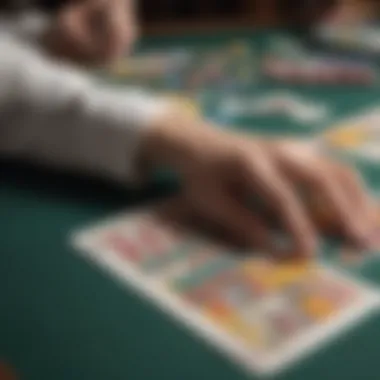Understanding Scratch-Offs: Costs, Odds, and Insights


Intro
Lottery games capture the imagination of many, especially when it comes to scratch-off tickets. These vibrant, colorful cards can quickly transform a dull afternoon into a moment filled with hope and anticipation. However, delving into the financial aspects of scratch-offs reveals a world that is not merely about luck or chance—there's a complex interplay of costs, odds, and psychological factors at play.
Understanding these elements is vital for anyone considering participation in scratch-off games. Not only can it save your wallet some wear and tear, but it makes the experience more enjoyable and informed. This article aims to dissect the various components that influence the scratch-off experience, guiding players toward more mindful and strategic choices.
Game Strategies
Strategy Basics
When it comes to scratch-offs, players often toss caution to the wind, scratching away at random tickets, believing that each ticket holds the key to fortune. But what if one could enhance the odds—not just by chance but by employing sound strategies? Understanding the costs and odds might be the first step, but having a game plan can effectively shape the approach. Here are some basics:
- Choose Wisely: Research tickets that offer the best odds of winning. Occasionally, the more expensive tickets yield better potential winnings, but always assess whether the increased cost aligns with your budget.
- Stay Within Budget: Set a spending limit before your scratching spree. Stick to it like glue—it's easy to get swept up in the excitement and overspend.
Advanced Techniques
For those looking to get more serious about their scratch-off adventures, consider honing advanced strategies. Here are a few to contemplate:
- Look for New Games: New scratch-off games might have higher payout percentages initially to attract players. This can provide an edge early in the game's life cycle.
- Group Play: Consider pooling resources with friends or fellow players to buy a variety of tickets. If one ticket wins, the satisfaction is shared, and your risk is collectively mitigated.
A wise man once said, "Luck is what happens when preparation meets opportunity."
Responsible Gambling
Recognizing Gaming Limits
While the allure of scratching your way to riches can be intoxicating, maintaining an awareness of personal limits cannot be overstated. It’s crucial to know when to step back. Here are some signs it might be time for a breather:
- Increased frequency in purchases beyond your set budget.
- Playing to recoup losses rather than for enjoyment.
Resources for Support
If gambling begins to feel more like a burden than a fun pastime, numerous resources are available to help:
- Gamblers Anonymous: A support group that offers assistance through shared experiences. (Visit Gamblers Anonymous)
- National Council on Problem Gambling: Provides resources and guidance for those looking to regain control over their gambling habits.
By understanding the dynamics of scratch-offs and implementing practical strategies alongside responsible gambling principles, players can engage more thoughtfully in this form of entertainment. Remember, while the promise of a life-changing win is tantalizing, it should never come at the expense of financial stability or personal well-being.
The Basics of Scratch-Offs
Understanding the world of scratch-off lottery tickets is essential, especially for individuals drawn to games of chance. Scratch-offs offer a unique blend of excitement and complexity that can sometimes be overlooked. They are not just simple pieces of paper; they represent a microcosm of larger gambling practices, complete with their own set of costs, odds, and psychological influences. Key elements include their appeal, mechanics, and how they interconnect with broader gaming trends.
What Are Scratch-Offs?


Scratch-offs, commonly known as scratch tickets, are instant-win lottery games where players can scratch off a layer on the ticket to reveal symbols or numbers underneath. The game’s design allows for immediate gratification, offering players the thrill of potentially winning on the spot. Each ticket typically has a certain price, and the prizes can range from small amounts to life-changing sums. A close look reveals a variety of themes and artwork on these tickets, turning them into collectible items in the eyes of some players.
To the average person, it might seem like they’re just buying a chance at winning a jackpot. However, there’s a lot more going on beneath the surface. The ticket's design is carefully crafted, ensuring that the odds are balanced between encouraging play and generating revenue for the issuing state.
History and Popularity
The history of scratch-off tickets dates back to the late 1970s, with the first products hitting the market in Massachusetts. Initially, these tickets were met with skepticism, but as word spread of the instant wins, they gained rapid popularity. The concept tapped into the desire for immediate results, contrasting sharply with traditional lottery games where waiting was part of the fun.
The blend of luck and instant feedback led to a meteoric rise in sales. Nowadays, scratch-offs form a significant part of the lottery market. They attract a diverse audience—from seasoned gamblers to casual players looking for a bit of fun. Each state has its own unique offerings, showcasing local trends and interests.
"Scratch-offs create not just players, but also a community of enthusiasts discussing strategies, luck, and experiences."
Cost Analysis of Scratch-Offs
When it comes to scratch-off tickets, understanding the financial aspects is just as crucial as the thrill of playing. The section on cost analysis dissects several dimensions of scratch-offs, helping players to gauge whether their investments are worthwhile. Here, we’ll look at different price ranges, key factors influencing these prices, and how costs can vary across states. The insights provided will empower players, allowing them to make smarter gambling choices without falling prey to impulsive buying or inflated expectations.
Price Ranges of Scratch-Off Tickets
Scratch-off tickets aren't all created equal. They come in a myriad of price ranges, typically falling anywhere from one dollar to twenty dollars, with some even reaching fifty for special editions. Each price point caters to different players' budgets and risk appetites.
- Low-priced tickets: These generally range from $1 to $5. Often, they offer more frequent but lower payouts. For someone looking to dabble without spending a fortune, this tier might just be the way to go.
- Mid-range tickets: Tickets priced between $5 and $10 often provide a better balance between cost and potential return. The excitement ramps up here, pulling in players who are willing to risk a bit more.
- High-stakes tickets: Prices over $10 can create a palpable tension, as the payouts are significantly larger. However, the odds of winning big with these tickets are also lower, making the investment tricky to navigate.
The choice of ticket can also reflect a player's strategy, whether they seek regular thrills or are willing to take a gamble on more danjtous bets.
Factors Influencing Scratch-Off Prices
Price isn't determined solely by the surface value; several other factors come into play. These can include:
- Distribution Costs: The expenses involved in printing and distributing the tickets can significantly impact their price. Higher costs often mean a higher price for the consumer.
- Payout Structures: Generally, higher-priced tickets come with more generous payouts. This means they return a greater percentage of ticket sales back to players, but it can also lead to higher prices.
- Prize Pool and Jackpot Sizes: The size of the jackpot or the total prize pool influences ticket pricing. Bigger jackpots mean bigger ticket prices, as operators must market the allure of substantial potential wins.
- State Regulations: Different states have different laws regarding gaming. A state that requires more substantial payouts proportionate to sales will price its tickets accordingly.
Understanding these influencing factors can prepare players for what to expect, so they're not caught off guard at the checkout.
Comparative Costs Among Different States
When you take a look at scratch-off prices across the United States, it's clear that geographic location matters. Scratch-off tickets can vary widely, even for identical games.
- In states like California, scratch-off tickets can start as low as $1. The competition among vendors drives prices down for entry-level tickets.
- Conversely, New York tends to be a bit steeper, with prices often starting at $2. The players there might pay a little more for that sense of urgency and potential for instant gratification, creating a different culture surrounding ticket purchases.
- Florida has some unique offerings, especially in tourism areas where high-priced scratch-offs vie for visitors' dollars.
Understanding the state-by-state nuances can save players a pretty penny. Therefore, it’s wise to shop around and consider where your scratch-off funds will yield the most bang for your buck.
"Cost isn’t just a number; it’s a reflection of the gaming landscape that can change based on where you are."
Understanding Odds and Payouts
When it comes to scratch-off tickets, understanding the odds and payouts is as crucial as knowing the costs associated with buying them. Unlike traditional lottery games, scratch-offs offer an instant joy but come hand in hand with intricate dynamics. Knowing the odds not only informs players about their chances of winning, but it also aids in making more calculated decisions when it comes to spending money on these enticing tickets.


How Scratch-Off Odds Are Determined
Odds in scratch-off lottery games are usually determined by a blend of ticket sales, the total number of tickets printed, and the prize structure. Here's a closer look:
- Ticket Production and Distribution: The total number of tickets produced can significantly influence the odds. Each ticket has a unique set of outcomes, which can range from winning that elusive jackpot to winning nothing at all.
- Prize Pools and Amounts: Depending on the price of a ticket, the prize pool also varies. A ticket priced at five dollars typically has better prizes — and possibly better odds — than a lower-priced one. Lottery operators must ensure that they balance the potential payouts with the revenues they expect to generate.
- Statistical Models: Most states rely on complex statistical models to determine the likelihood of winning. These models analyze previous game data, ticket sales, and current trends to create a winning formula that attracts players while maintaining profitability for the lottery.
Understanding these odds is paramount for bettors who take their gaming seriously. The less favorable the odds are, the more discerning a player should be about how many tickets they buy.
Local vs. National Scratch-Off Programs
The landscape of scratch-off tickets isn't solely uniform. There exist two distinct categories: local and national programs. Each has its characteristics and caters to different preferences.
- Local Programs: Generally run by state lotteries, these programs have odds and payouts tailored to the local populace. For instance, the California Lottery may have scratch-offs emphasizing regional themes or symbols, drawing local interest. The odds might also be more favorable, primarily when designed to encourage local engagement.
- National Programs: On the other hand, national scratch-offs target a broader audience, encompassing players from various states. These often have larger jackpots but come with odds that reflect higher competition — everyone from Maine to California is in the mix. Things can get tricky when trying to gauge the chances of winning as a player; local games may offer lower competition but smaller overall payouts, while national games bring in more substantial prizes but at a steeper cost and greater risk.
Understanding the difference between these two formats can be advantageous for a player wanting to optimize their chance of securing a win.
Comparison of Payout Percentages
Payout percentages represent the fraction of ticket sales that gets returned to players as winnings. A player should keep these percentages in mind when choosing which tickets to purchase. Here's how the comparisons typically stack up:
- Higher Payout Percentage: Scratch-offs generally contain a payout percentage that can range from 50% to 70%. A higher percentage means that more of the money generated from ticket sales is reinvested into payouts, thus thrilling players with chances to win big.
- Variability Based on Game Type: Not all games are created equal. Some tickets regularly maintain a payout percentage in the mid to high 60s, while others might dip below the average due to lower ticket prices. Players need to analyze this data carefully before making a buying decision.
- State by State Differences: Payout percentages also vary across states. Some states may offer more generous payouts to entice players, while other states may have stricter regulations that limit how much can be paid out. Checking the specifics of each state's offerings helps players choose wisely.
"Understanding the payout percentage is crucial; it’s the ticket’s way of telling you the odds of winning big."
By considering odds and payout percentages, players can align their expectations with reality, potentially leading to more satisfying experiences. It's not merely about luck; it's about informed choice.
Psychological Aspects of Playing Scratch-Offs
Scratch-off lottery tickets are not just games of chance; they tap into deep psychological triggers that drive human behavior. Understanding these factors can help gamers navigate their experiences and make smarter decisions. The motivations behind purchasing scratch-offs are multifaceted. For some, it’s the lure of immediate rewards while for others, it’s a form of escapism. Thus, discussing the psychological aspects gives valuable insights into why players often find themselves drawn to these tickets despite the odds.
The Thrill of Instant Gratification
Scratch-offs are designed to cater to the human craving for instant rewards. The moment a player scratches the ticket, they experience a rush of excitement. There’s an adrenaline surge, akin to a rollercoaster ride, where uncertainty reigns. This instant gratification is a powerful motivator in our fast-paced world, where people often seek immediate satisfaction from their actions. The anticipation of winning money, even if it’s a small amount, creates a sense of pleasure that can reinforce the habit of playing.
Many players have shared their experiences, noting that the feeling of winning—even if just a dollar—can spark a euphoric high. It’s like hitting the lottery, even when it’s a minor win. This rush becomes addictive, turning scratching into a routine or a fun pastime at the shops. However, this thrill can cloud judgment, tempting players to spend beyond their means as they chase the next tickling sensation.
Addiction and Behavioral Risks
While scratch-offs may provide fun, they also carry the risk of developing harmful behaviors. The addictive nature of these tickets can lead to compulsive gambling, where the enjoyment fades and financial implications rise. Research indicates that individuals who frequently engage in lottery games might face increased risks of addiction. Many find themselves overcommitting time and money to chase a fleeting opportunity for a big win.
Furthermore, societal perceptions play a role. When friends or family engage in scratch-offs and discuss their rare wins, it can create an illusion that it’s an easy way to make money. This social reinforcement can lead newcomers to join in, unaware of the potential long-term consequences on their finances and emotional well-being.
Strategies for Responsible Play


Understanding the psychological triggers at work is crucial for promoting responsible use of scratch-offs. Here are some strategies to consider:
- Set a Budget: Before even buying a ticket, determine how much you are willing to spend. Stick to this budget fiercely to avoid overindulgence.
- Limit Frequency: Just like any other entertaining activity, moderation is key. Instead of playing every day, restrict yourself to specific times or events.
- Focus on Enjoyment: Shift the mindset from winning to enjoying the activity itself. Remember, it’s a game, and the goal should be fun, not finance.
- Educate Yourself: Awareness of the odds and mechanics behind scratch-offs can help mitigate the emotional response associated with winning or losing. Knowledge is power and can keep you grounded.
- Seek Support if Needed: For those who feel their habits are spiraling, it’s wise to reach out for help. There are support groups and resources available to assist individuals struggling with gambling addiction.
"The journey into responsible gambling starts with the understanding of one’s own psychology."
By reflecting on how and why we engage with scratch-offs, players can find a balance that allows them to enjoy the game while minimizing potential risks. In essence, understanding the intricacies of psychological influences is not just beneficial; it’s essential for enjoying scratch-offs healthily and sustainably.
Evaluating the Value of Scratch-Offs
Understanding the true value of scratch-off tickets involves more than simply assessing the price on the ticket itself. It involves a multitude of elements that intertwine to paint a comprehensive picture of their worth. For serious players, this evaluation is crucial as it helps determine not only the financial commitment involved but also the overall satisfaction derived from participating in this form of gambling.
Before diving deep, it is essential to comprehend that the perceived value can greatly vary from player to player. While some might see scratch-offs solely as a means of entertainment, others view them as potential investment opportunities. Let's explore some key aspects to consider.
- Entertainment vs Investment: Many players treat scratch-offs as a fun activity—like buying a movie ticket—while others dive in thinking they can beat the odds and make a profit. Understanding this difference can fundamentally shift one's approach toward scratch-offs.
- Emotional Factors: Decisions in this realm aren't always made rationally. Emotional well-being may lead players to indulge in purchases purely for the thrill, regardless of the expected monetary value.
- Probability and Risk Assessment: An honest evaluation hinges upon understanding each ticket's odds and returns. With careful analysis, players can decide if potential returns outweigh the inevitable risks.
Each of these components shapes the strategy a player might deploy, impacting whether shelling out cash for a scratch-off aligns with their own financial goals.
Are Scratch-Offs Worth the Investment?
This question looms large over any discussion related to scratch-offs. The truth is that potential worth varies not only by the ticket itself but also among players themselves, depending on what they hope to gain from it.
- Low Entry Costs: A significant allure of scratch-offs is the relatively low cost required to purchase a ticket. This means anyone with a few bucks to spare can jump into the game without heavy financial repercussions.
- Potential for High Returns: Depending on the ticket, payouts can range widely. Some tickets offer sizable rewards that can make a dent in one's interest but remember, they can also be deceptive. The lower the cost, the more tickets sold, thereby diluting the odds for jackpot winners.
- Placebo Effect of Winning: The enjoyment of winning—even if small—can reinforce continued play. The cosmic thrill of scratching off to reveal a prize can sometimes feel more rewarding than it actually is, masking the statistical reality of losses.
In general, they can be pinpointed as more of a nuanced gamble than a solid investment. Players must gauge their expectations and approach with caution.
Potential Returns and Financial Implications
When evaluating scratch-offs, it's crucial to analyze not only the potential returns but also the broader financial implications.
- Break-Even Play: To grasp whether scratch-offs are truly worth it, players often analyze what they need to win to cover the initial costs of tickets. In many cases, breaking even can seem harder than it sounds, with numerous players walking away empty-handed or worse, losing more than they initially planned.
- Long-Term Perspective: A quick rush from an occasional win can be deceiving. Evaluating monetary returns over an extended period often reveals sobering statistics regarding losses, outweighing the allure of immediate gratification.
- Budget Diversion: Participants should also consider how scratch-offs impact their financial health. Budgeting for such tickets is vital; losing significant amounts can impair financial goals.
- Community and Impact: Lastly, contributing to state funding through ticket purchases can be a point of contention. Understanding where the money goes and the local impact can influence players' feelings about their participation.
Each of these factors must be thoughtfully integrated into any risk-return assessment, providing a clearer vision of whether scratch-offs are a fool’s errand or a reasonable form of entertainment. In a world filled with pursuits requiring caution, scratch-off tickets certainly need an astute and informed approach.
Concluding Thoughts
As we wrap up our exploration of scratch-offs, it's essential to recognize their evolving nature and the myriad implications for both casual players and serious gamblers. This section not only recaps the critical elements discussed throughout the article but also emphasizes the significance of making informed choices in this often impulsive arena.
The Future of Scratch-Offs
Looking ahead, scratch-off tickets are likely to witness a blend of innovation and tradition. Given their sustained popularity, manufacturers are not just resting on their laurels. They are expected to introduce new themes, varied prize structures, and even technological advancements. For instance, we might see an increase in the integration of digital platforms catering to a younger demographic. As smartphones become ubiquitous, the potential for mobile applications offering scratch-off games seems almost inevitable.
Players might also see more options that allow for interactive experiences, such as augmented reality features, which can enhance engagement and player satisfaction. Additionally, law-makers may impose stricter regulations focused on ensuring fairness and player protection, making it mandatory for lotteries to be more transparent about their odds and returns. These shifts highlight the importance of staying informed about the evolving landscape, allowing players to navigate their choices more wisely.
Final Recommendations
For any individual considering scratch-offs as a viable entertainment option, here are some practical recommendations:
- Do Your Homework: Before purchasing a ticket, look into the odds and payouts of various games. Being aware of the prize pot size and the likelihood of winning can save you from rash decisions.
- Set a Budget: Establish clear limits on how much you're willing to spend. It’s easy to get swept up in the excitement, but a strategy often helps in maintaining balance.
- Mix it Up: If you decide to try scratch-offs, consider varying your play with different tickets. Sometimes, lower-priced tickets give better chances of winning relative to the investment.
- Be Wary of the Illusion: Understand that while scratching off a ticket might deliver thrills, it’s not a guaranteed path to riches. Approach the experience with realism and treat it as a form of entertainment rather than an investment vehicle.
- Educate Others: Share your insights with friends or family who might be newcomers to scratch-offs. Helping others understand the odds could foster a more informed and enjoyable experience.
In summation, scratch-offs are more than just a game of chance; they weave into the fabric of entertainment, personal finance, and psychological influences. By acknowledging the landscape, players can better navigate their choices, ensuring a more rounded and fulfilling experience.



